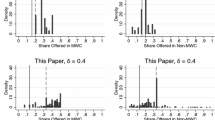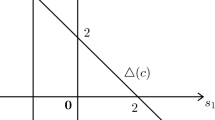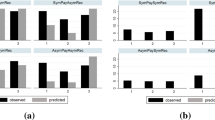Abstract
We analyze a rent-seeking contest that determines the bargaining protocol in a one-dimensional bargaining game, where agents preferences over social outcomes are single-peaked. We relate the incentives of agents to make unproductive and costly efforts/investments to the quota rules that are required to implement agreements. When the contest assigns persistent recognition probabilities, we find that simple majority minimizes the total investments and, hence, inefficiency. In case that the contest recurs each period, multiple equilibria exist with the particularity that in each equilibrium only one agent controls the agenda of the bargaining process.
Access this article
We’re sorry, something doesn't seem to be working properly.
Please try refreshing the page. If that doesn't work, please contact support so we can address the problem.
Similar content being viewed by others
References
Banks JS, Duggan J (2000) A bargaining model of collective choice. Am Political Sci Rev 94: 73–88
Banks JS, Duggan J (2006) A general bargaining model of legislative policy-making. Q J Political Sci 1: 49–85
Breitmoser Y (2011) Parliamentary bargaining with priority recognition for committee members. Soc Choice Welf 37: 149–169
Cardona D, Ponsatí C (2011) Uniqueness of stationary equilibria in bargaining one-dimensional policies under (super) majority rules. Games Econ Behav 73: 65–75
Che Y-K, Sákovics J (2004) A dynamic theory of holdup. Econometrica 72: 1063–1103
Cho S-J, Duggan J (2009) Bargaining foundations of the median voter theorem. J Econ Theory 144: 851–868
Eraslan H (2002) Uniqueness of stationary equilibrium payoff in the Baron–Ferejohn model. J Econ Theory 103: 11–30
Evans R (1997) Coalitional bargaining with competition to make offers. Games Econ Behav 19: 211–220
Kalandrakis T (2006) Proposal rights and political power. Am J Political Sci 50: 441–448
Lagunoff RD (1994) A simple noncooperative core story. Games Econ Behav 7: 54–61
Moldovanu B, Winter E (1995) Order independent equilibria. Games Econ Behav 9: 21–34
Perry M, Reny P (1994) A noncooperative view of coalition formation and the core. Econometrica 62: 795–817
Predtetchinski A (2011) One-dimensional bargaining. Games Econ Behav 72: 526–543
Quérou N, Soubeyran R (2011a) Voting rules and bargaining with costly persistent recognition. Documents de Recherche du LAMETA, DR. num 2011-04
Quérou N, Soubeyran R (2011b) On the (in-)efficiency of unanimity in multilateral bargaining with endogenous recognition. Documents de Recherche du LAMETA, DR. num 2011-14
Tullock G (1974) The social dilemma: the economics of war and revolution. University Publications, Blacksburg
Tullock G (1980) Efficient rent-seeking. In: Buchanan J, Tollison R, Tullock G (eds) Toward a theory of the rent-seeking society. Texas A&M University Press, College Station, pp 3–15
Yildirim H (2007) Proposal power and majority rule in multilateral bargaining with costly recognition. J Econ Theory 136: 167–196
Yildirim H (2010) Distribution of surplus in sequential bargaining with endogenous recognition. Public Choice 142: 41–57
Author information
Authors and Affiliations
Corresponding author
Rights and permissions
About this article
Cite this article
Cardona, D., Polanski, A. Voting rules and efficiency in one-dimensional bargaining games with endogenous protocol. Soc Choice Welf 41, 217–240 (2013). https://doi.org/10.1007/s00355-012-0681-3
Received:
Accepted:
Published:
Issue Date:
DOI: https://doi.org/10.1007/s00355-012-0681-3




